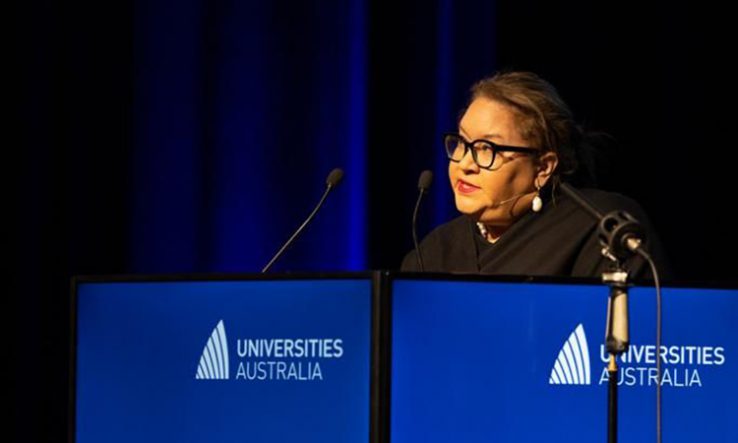
Image: Universities Australia
Failure to support constitutional reform to give Indigenous Australians better representation would be “political”
Australian universities should take a position on the proposed Voice to Parliament, a co-chair of the Uluru Dialogue group at the University of New South Wales has told a national gathering.
The Voice to Parliament is a proposed advisory group containing Aboriginal and Torres Strait Islander people, which would be enshrined in the Australian constitution. Prime minister Anthony Albanese has announced that a referendum will be held on the matter.
Megan Davis (pictured), a constitutional lawyer who is pro vice-chancellor for Indigenous issues at the university, told Universities Australia’s annual conference on 22 February that silence over the referendum would be a “political” decision.
Her university has committed to supporting the ‘yes’ vote in the referendum, and many universities have come out in support for the Uluru Statement from the Heart, a petition for the constitutional change, but have not yet made a statement on the Voice to Parliament.
“The decision not to support is political…Silence is political,” she said. “Universities work on dispossessed land.”
The stance taken by the University of New South Wales has made it a leader “for not hiding behind what all universities know is false: objectivity”, Davis said.
Gathering support
Davis told Research Professional News that she expected to keep talking to universities over the coming months about getting explicit support.
In her keynote speech, she said that a detailed proposal on the form of the Voice to Parliament would be released within a month, once a referendum date is set.
Public support is key to the process, she said. “It’s Australians we are asking to say ‘yes’ to this because if you take it to the politicians we will never get there.”
Davis concluded her speech with a full reading of the Uluru Statement from the Heart, which was met with a standing ovation by the conference audience.